The Sky diet
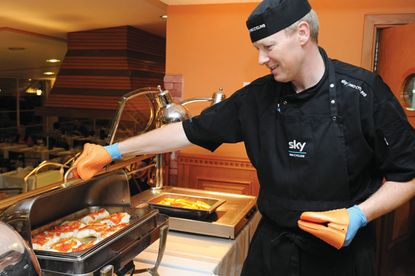
"The concept of marginal gains is one that's underpinned our work, development and success over the last few years. Most of those things were in place already, so what we did this year was focus massively on the basics," says Nigel Mitchell when I ask him if he made any changes to his approach for what has been the most successful year in British cycling history.
And Mitchell feels that there are lessons ordinary cyclists can learn from his approach. "Club riders can get diverted by looking at the tweaks we do and overlook the basics, but we've proved this year that getting the basics right is crucial, and the other stuff, the marginal gains, just lies on top of that. In fact they won't work unless you get the basics right," he says.
But, as Mitchell explains, in typical British Cycling style, they do the basics very, very well. Take hydration: "We ensure all our riders, whether track, road or in Team Sky know the value of staying hydrated and how to tell if they aren't.
In the Grand Tours the doctor weighs the riders every morning and they supply a urine sample. The sample is tested in a device and the urine concentration established. That gives us a day-to-day picture, and if we see signs of dehydration we push their fluids a bit more," Mitchell says.
Staying hydrated gets overlooked, but it's crucial. Your training and adaptation to it are compromised if you don't stay hydrated. Dehydration can cause your performance to drop; your gut may stop functioning properly, thus preventing you from absorbing vital nutrients, and the cells all around your body will be further stressed.
The way Team Sky approaches hydration is taken to the nth degree because they race to the nth degree, but Mitchell stresses that the rest of us can keep track of how hydrated we are with a couple of simple daily checks. "Anybody can weigh themselves and you can even download urine colour charts on the internet, which helps." But the basic message is quite simple: if you are already lean and start losing weight, and/or your urine isn't clear you should drink more.
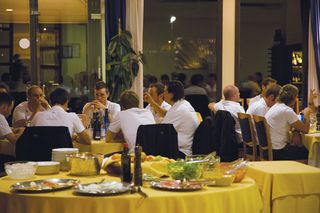
Grand Tour focus
Get The Leadout Newsletter
The latest race content, interviews, features, reviews and expert buying guides, direct to your inbox!
All the Team GB riders know about hydration and what food to eat, they are all advised by Mitchell and all have access to him, but it can be hard to ensure nutrition is properly regulated and enforced during Team Sky's Grand Tour campaigns. Because of the nature of their demands, three weeks of full-on racing over any terrain in any weather, where the riders change location almost every day, competing against the best in the world in the best teams in the world. It's an extremely tricky environment in which to operate.
To overcome these issues, Mitchell works closely with Team Sky's chef, Soren Kristiansen, who as well as creating mouth-watering food, knows lots about sports nutrition. He and Mitchell liaise when the team are on Grand Tours, but Mitchell stresses: "Soren chooses the menus and we discuss ideas. He can contact me any time and I get feedback from the doctor too."
Kristiansens's meals are there for anyone to copy. It's just basic good nutrition with a pinch of marginal gains thinking. "As well as the big Sky races, Soren did the Olympic road holding camp," Mitchell says. "The meals he makes have a variety of quality carbohydrate sources and the same for protein. If we do anything you might not do at home it's liquidise vegetables and salad stuff for anyone not wanting the volume they provide.
"On the subject of fruit and veg though, that's another place where your readers can follow a basic thing we follow: the five a day rule. Consider it a minimum and try to eat at least five portions of different fruit and veg a day. Another good rule to follow is to make your plate as varied, colourful and bright as possible. Bright and strong-coloured fruit and veg are the best sources of vitamins, minerals and antioxidants," Mitchell explains.
On occasions, where Mitchell has noticed one of his riders' weight dropping, he'll tell them to eat more protein over the course of a few days. Protein is an area where Mitchell believes most keen club racers go wrong. "A lot of cyclists underestimate their protein needs. A Tour de France rider needs two grams of protein for every kilogram of body weight. Club racers and fitness cyclists don't need that much, but they make the mistake of having the majority of their protein in one, or maybe two meals. You should have quality protein with every meal so your intake is spread throughout the day," he says.
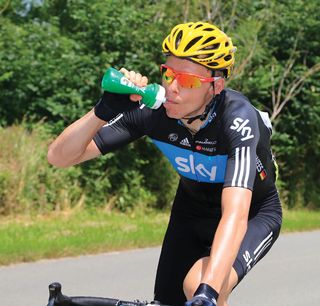
Protein partitioning
Your body tries to repair itself all day, but it can only use a certain amount of protein at once. If too much gets delivered in one go it can't all get used for repair but can be stored as fat, even though your muscles could still be crying out for protein. If you drip-feed the same amount of protein over three or four meals it has a much greater benefit. You recover quicker, build lean muscle and reduce your body fat.
Team GB and Sky riders spread their protein by having omelettes as part of their breakfast and a recovery drink or even a meal with protein in it immediately after racing or training. They will also have some protein before bed, such as yogurt or a protein drink.
"The recovery drinks are to exploit the window to refuel that occurs straight after exercise, and the night-time yoghurt or drink ensures that protein is available while the riders sleep. This helps them recover," Mitchell says.
But talking about protein shakes takes us to the vexed subject of the multi-million pound sports nutrition industry. "Sports foods are there to support the diet, not replace it," Mitchell stresses. Sport supplements are a great safety net, they are convenient, but normal food must come first.
"We use fish oils and that's one place where everybody benefits from sports nutrition. The modern diet doesn't provide enough omega 3 fats, so I recommend everybody take fish oils. Other products can be used to fill in gaps, and they are convenient and effective, but they shouldn't replace a good diet," Mitchell says.
Team Sky have normal food for their post-race meal, as well as sports foods, as Mitchell explains. "The post-stage meal is really important. We have cooked rice for the riders, which we use in the form of rice cakes during races. Rice is great, it contains easily digested carbohydrates, some protein and lots of water, which helps with hydration."
Gut health
Another of Mitchell's central tenets is gut health. Maintaining gut health is very important, and often gets overlooked. As he points out: "The best nutrition strategy in the world won't work if your gut isn't in good condition. It just won't absorb what you need, so you won't be getting the protein and micro and macronutrients to help you adapt to the training you do."
Staying hydrated helps the gut do its work, and you can invest in live yogurts that contain probiotics, as they help they kill harmful gut bacteria. But the main thing is to maintain the stomach in the narrow ph band where it works best. Broadly speaking the best way to do that is to cut down on meat, alcohol, soft drinks, caffeine, most nuts, eggs, vinegar, sauerkraut, ascorbic acid, cheese, white sugar and medical drugs. And try incorporating more foods into your diet such as raw vegetables, ripe fruits, beansprouts, water, milk (goat's is best), onions, figs, carrots, beetroot and miso.
Remember, you don't have to go down the marginal gains route to improve performance, but you must get the basics right. Take a long look at your diet and apply the pick-up points we've listed in this article to it. Then when you have the basics right then maybe you can buy one of those ‘marginal gains' aerodynamic road race helmets that are coming out in the wake of the Olympics, and it actually will make you faster. Even if they do look like Lego made them.
Nigel Mitchell's simple tips
* Treat sports foods as a back-up and don't use them to replace real foods.
* Eat and drink as soon as possible after hard training.
* Take a daily fish-oil supplement.
* Eat at least one probiotic yogurt per day.
* Cut your consumption of foods that vary stomach ph and increase those that maintain it.
* A glass of V8 vegetable juice per day is great for maintaining stomach ph.
The basics of hydration
* Weigh yourself every morning and drink more fluids on days when you see your weight drop.
* Monitor the colour of your urine: it should be clear or pale yellow. If it's darker than that, drink more water.
* Fluids mean water, fruit and veg juices and sports drinks. Some soft drinks, alcohol and coffee don't count.
* Try to drink two to three litres of water a day; more if it's hot or if you spot any signs of dehydration.
The basics of diet
* Eat complex rather than simple carbohydrates. That means having brown or basmati rice instead of white rice, or eating wholemeal pasta instead of plain.
* Limit potatoes but bear in mind that any carbohydrate eaten with protein will slow its absorption - so don't get too cranky about this.
* Eat some quality protein with every meal but reduce the amount of protein you eat at one sitting.
* Eat at least five portions of different fruit and veg each day.
* Eat the brightest coloured fruit and veg.
* Keep the saying ‘the most colourful plate is the healthiest plate' in mind for as many meals as possible.
Do it like the pros
This is what Team Sky's chef, Soren Kristiansen prepared for his riders after stage six of the Tour of Spain from Tarazona to Jaca.
* Starter: A smoothie made from beetroot, carrot, ginger and pineapple.
CW says: This is a real performance-boosting post-race mix that promotes optimal stomach ph and reduces inflammation, both factors that promote good nutrient absorption.
* Main course: Choice of baked salmon fillet or turkey breast with cauliflower and broccoli cooked with garlic and thyme, and either pasta or rice.
CW says: This is all stuff that's easy to digest and absorb in a healthy gut, with a mix of foods that support the immune system
* Dessert: Peaches and apples in a light caramel sauce.
CW says: Well, you've got to have something sweet, haven't you? And peaches and apples are part of your five a day.
Alex Dowsett's view
The better food you put in, the better you respond. It's important to have a balanced diet with plenty of fruit and veg. Then work from there, making sure you've always had enough fuel.
If you're trying to lose weight, don't try to lose weight and train; do one or the other. If you're trying to lose weight go through a phase of light training so you're not compromising either one.
Nigel can usually tell if we've been eating healthily or not. For example, our skin goes quite dry if we haven't had enough of our fish oils. It's mainly healthy eating. I went round to Cav's when Nige was getting him ready for the Tour and the Olympics and we had a four-course meal: soup, salad, roast and then cheesecake.
Nige had made it all so it was all good stuff. For example, the cheesecake was made with dark chocolate and sweetened with orange juice, which I was pleasantly surprised at - it tasted much better than I expected!
When Nigel's happy we've got the basics we then start looking at the more technical aspects. If I'm trying to drop a bit of weight, I might do rides before breakfast but he's conscious of us trying to push it too far.
So he says to me, have a scoop of coffee, which gets your metabolism up, a scoop of the pro-peptide, which is pure protein, just to give your body a bit of something to work off. So you'd ride real easy for an hour to an hour and a half and then you'd have a decent breakfast.

Thank you for reading 20 articles this month* Join now for unlimited access
Enjoy your first month for just £1 / $1 / €1
*Read 5 free articles per month without a subscription

Join now for unlimited access
Try first month for just £1 / $1 / €1
Founded in 1891, Cycling Weekly and its team of expert journalists brings cyclists in-depth reviews, extensive coverage of both professional and domestic racing, as well as fitness advice and 'brew a cuppa and put your feet up' features. Cycling Weekly serves its audience across a range of platforms, from good old-fashioned print to online journalism, and video.
-
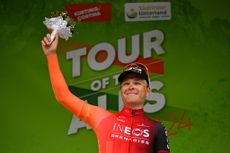 'I spent five weeks on the sofa': How Tobias Foss overcame illness and got back to winning ways
'I spent five weeks on the sofa': How Tobias Foss overcame illness and got back to winning waysAt the Tour of the Alps, the Ineos Grenadiers rider took his first victory since becoming world time trial champion in 2022. The 19 months in between proved a bumpy ride
By Tom Davidson Published
-
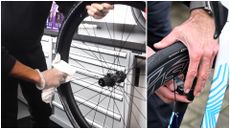 I'm a mechanic - here's how I keep tubeless setups safe
I'm a mechanic - here's how I keep tubeless setups safeTubeless setups, including hookless, can be safe if you know the pitfalls and take the right precautions
By Joe Baker Published